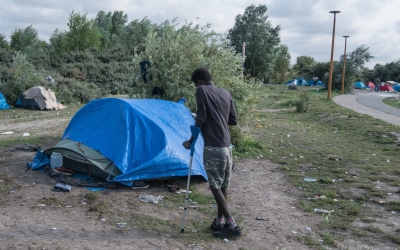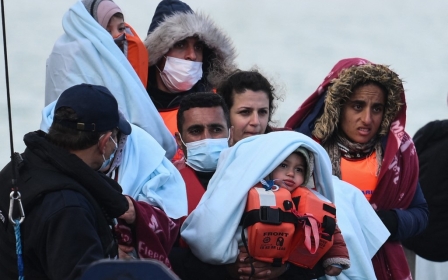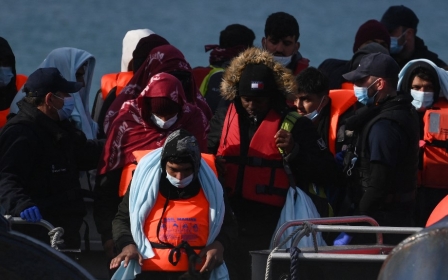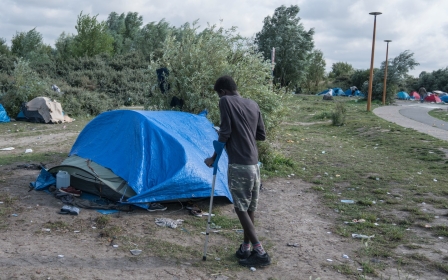UK: European Court ruling cancels first Rwanda flight deporting asylum seekers
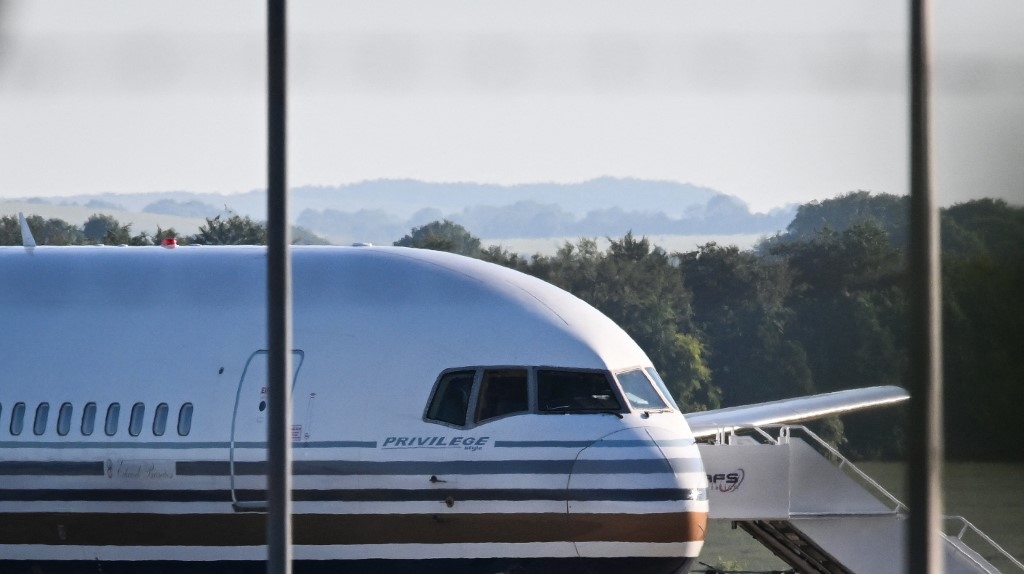
The British government on Wednesday insisted it would go ahead with its decision to deport asylum seekers to Rwanda after the first flight was cancelled on Tuesday following a court ruling.
A last-minute order by the European Court of Human Rights (ECHR) led to cancelling tickets for all seven passengers on the flight that was scheduled to take off on Tuesday evening from a military base in Amesbury, Salisbury.
The passengers included two Iraqi Kurds, three Iranians, one Albanian and one Vietnamese.
In response, British Home Secretary Priti Patel vowed her government would pursue its Rwanda policy despite the cancellation.
“We will not be deterred," she said in a statement.
New MEE newsletter: Jerusalem Dispatch
Sign up to get the latest insights and analysis on Israel-Palestine, alongside Turkey Unpacked and other MEE newsletters
"Our legal team are reviewing every decision made on this flight and preparation for the next flight begins now."
'This Rwanda flight signals the end of any notion of the UK as a place of democracy and human rights'
-Karen Doyle, Movement for Justice
Meanwhile, Rwanda also confirmed its commitment to the deal, which was announced in April and has since been denounced by UN officials and human rights groups.
"We are not deterred by these developments," government spokeswoman Yolande Makolo told AFP on Wednesday. "Rwanda stands ready to receive the migrants when they do arrive and offer them safety and opportunity in our country."
The deal will reportedly cost an initial £120m ($157m), but critics have stated the total cost will be much higher.
It will also see single men arriving in the UK in boats and lorries have their asylum claims processed in the African country, and be encouraged to settle there.
Earlier this week, UN refugee chief Filippo Grandi called the UK government policy "all wrong" and said it should not be "exporting its responsibility to another country".
Church of England leaders, including its most senior cleric, the Archbishop of Canterbury Justin Welby, reiterated their criticism of the policy as "one that should shame us as a nation".
The initial number of people expected on the flight to Rwanda was 130 but it was drastically reduced after several legal cases.
'Racist political theatre'
Activist groups campaigning for the release of the asylum seekers say the Rwanda plan says a lot about the government implementing it.
Karen Doyle, an organiser from the immigrant rights group Movement for Justice, told Middle East Eye that the latest development in the British government's harsh border politics is an unprecedented attack on immigrants.
"This Rwanda flight signals the end of any notion of the UK as a place of democracy and human rights. The courts have shown their willingness to stand up to the government on this, and now it is down to the people," Doyle said.
We must find every way possible to stop this and every Rwanda flight.
"This policy is nothing more than racist political theatre from a failing, corrupt government desperate to divide people and divert attention away from their crisis."
The UK Court of Appeal on Monday ruled that the first flight to take asylum seekers to Rwanda could go ahead on Tuesday, despite last-gasp legal attempts and protests against the policy.
The appeal was lodged by charities and a trade union against the deportations.
Claimants had argued that a decision on the policy should have waited until a full hearing on the legality of the policy next month.
A government source told the Guardian newspaper that the flight cost an estimated £500,000, which “had already been paid for from the public purse".
The first successful appeal accepted by the ECHR on Tuesday belonged to a 54-year-old asylum seeker and alleged torture victim from Iraq whose deportation case remains under judicial review in the UK.
“The European Court has indicated to the UK government that the applicant should not be removed to Rwanda until three weeks after the delivery of the final domestic decision in his ongoing judicial review proceedings,” the ECHR said.
The number of asylum seekers originally planned to take the first flight to Rwanda was 130 at the beginning of last week, but it fell to seven on Tuesday after successful appeals citing their vulnerability to human rights abuses in Rwanda.
'Parallel illegal system'
In April, Prime Minister Boris Johnson announced that some asylum seekers would now be processed in the African country.
“Anyone entering the UK illegally as well as those who have arrived illegally since January 1 may now be relocated to Rwanda,” he said.
“We cannot sustain a parallel illegal system. Our compassion may be infinite, but our capacity to help people is not.”
He added that the risk posed to those crossing the channel of potentially ending up in Rwanda instead of the UK would “over time prove a very considerable deterrent”.
Patel visited the Rwandan capital Kigali on the same day to unveil the new “migration and economic development partnership”.
In 2021, Middle East and North Africa countries made up 11 of the top 20 countries for those who came to the UK via small boats, according to data from the Home Office.
Iran was the highest with 7,874 arrivals, followed by Iraq with 5,414. Syria came in fourth.
An analysis by the Refugee Council in November found that most people arriving in the UK in small boats were likely to be fleeing persecution.
It said that 91 percent of people came from just 10 countries where human rights abuse was common - including Afghanistan, Syria, Iraq, Sudan, and Yemen.
Middle East Eye delivers independent and unrivalled coverage and analysis of the Middle East, North Africa and beyond. To learn more about republishing this content and the associated fees, please fill out this form. More about MEE can be found here.


